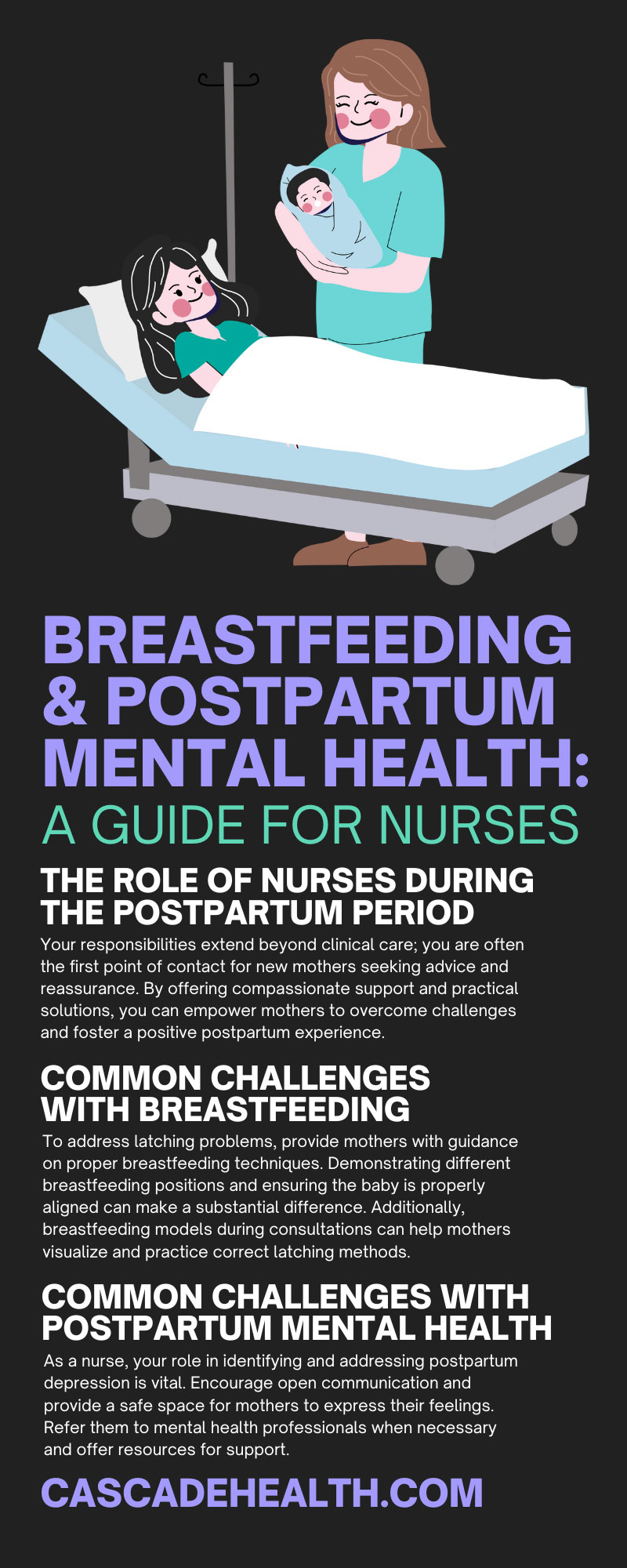Breastfeeding & Postpartum Mental Health: A Guide for Nurses
The postpartum period is a critical time for new mothers, marked by significant physical and emotional changes. As nurses and healthcare professionals, understanding how you can assist and advocate for postpartum mothers is paramount. We’ll provide a guide for nurses on breastfeeding and postpartum mental health so you can support mothers during this period.
The Role of Nurses During the Postpartum Period
Nurses play a pivotal role in maternal healthcare, providing essential support to new mothers navigating the complexities of breastfeeding and postpartum mental health. Your empathy, knowledge, and guidance can profoundly impact a mother's experience during this critical period.
Your responsibilities extend beyond clinical care; you are often the first point of contact for new mothers seeking advice and reassurance. By offering compassionate support and practical solutions, you can empower mothers to overcome challenges and foster a positive postpartum experience.
Common Challenges with Breastfeeding
Breastfeeding is a natural process, but it doesn't always come naturally to every mother. Various challenges can arise, making it difficult for mothers to establish and maintain successful breastfeeding practices. Understanding these common challenges is the first step in providing effective support.
Latching Issues
Latching problems are a significant hurdle for many breastfeeding mothers. When an infant has difficulty latching correctly, it can lead to discomfort for the mother and inadequate feeding for the baby. This issue often stems from improper positioning or anatomical differences.
To address latching problems, provide mothers with guidance on proper breastfeeding techniques. Demonstrating different breastfeeding positions and ensuring the baby is properly aligned can make a substantial difference. Additionally, breastfeeding models during consultations can help mothers visualize and practice correct latching methods.
Low Milk Supply
Low milk supply is a common concern among breastfeeding mothers. When a mother's body doesn't produce enough milk to meet her baby's needs, it can lead to anxiety and feelings of inadequacy. Various factors, including hormonal imbalances and stress, can cause this issue.
As a nurse, you can reassure mothers that low milk supply is often temporary and can be managed with the right strategies. Encourage frequent breastfeeding sessions to stimulate milk production and advise mothers to stay hydrated and maintain a balanced diet. In some cases, lactation supplements may also be beneficial.
Mastitis
Mastitis is a painful condition when breast tissue becomes inflamed, often due to a blocked milk duct or bacterial infection. Symptoms include breast pain, swelling, redness, and flu-like symptoms. Mastitis can be a significant barrier to successful breastfeeding.
To help mothers manage mastitis, emphasize the importance of continuing to breastfeed or pump to keep milk flowing. Warm compresses and gentle breast massage can also provide relief. If an infection is suspected, prompt medical antibiotic treatment may be necessary.
Strategies for Nurses to Assist with Breastfeeding
Nurses have a crucial role in supporting mothers through breastfeeding challenges. By employing effective strategies, you can help mothers overcome obstacles and establish a positive breastfeeding experience. Here are some practical tips:
- Education and Demonstration: Use breastfeeding models to demonstrate proper techniques and positions. Visual aids can enhance mothers' understanding and confidence.
- Encouragement and Reassurance: Provide emotional support and reassurance to mothers, letting them know that challenges are common and can be overcome with persistence and support.
- Individualized Care: Tailor your advice to each mother's unique situation. Every mother-baby pair is different, and personalized guidance can be more effective.
Common Challenges with Postpartum Mental Health
The postpartum period is both physically demanding and emotionally challenging. Many new mothers experience a range of mental health issues, which can impact their overall well-being and ability to care for their babies. Understanding these challenges is essential for providing comprehensive support.
Postpartum Depression
Postpartum depression is a serious condition that affects many new mothers. It goes beyond the "baby blues" and can significantly impact a mother's ability to function. Symptoms may include persistent sadness, fatigue, and feelings of hopelessness.
As a nurse, your role in identifying and addressing postpartum depression is vital. Encourage open communication and provide a safe space for mothers to express their feelings. Refer them to mental health professionals when necessary and offer resources for support.
Mood Swings
Mood swings are a common occurrence in the postpartum period, driven by hormonal fluctuations and the stress of adapting to motherhood. These emotional ups and downs can be overwhelming for new mothers.
To support mothers experiencing mood swings, offer strategies for managing stress and self-care. Encourage them to seek help from family and friends and remind them that taking breaks and prioritizing their well-being is okay.
Difficulty Bonding
Bonding with the baby is essential during the postpartum period, but it doesn't always happen immediately. Some mothers may struggle to feel an emotional connection with their newborn, leading to feelings of guilt and anxiety.
Reassure mothers that bonding can take time and offer tips to facilitate the process. Encourage skin-to-skin contact, engaging in gentle activities like singing and talking to the baby, and seeking support from loved ones.
Strategies for Nurses to Assist with Postpartum Mental Health
Supporting mothers' mental health is a critical aspect of postpartum care. Here are some strategies nurses can use to assist mothers effectively:
- Active Listening: Create a safe and non-judgmental space for mothers to share their feelings and concerns. Active listening can help mothers feel heard and understood.
- Resource Referral: Provide information about available mental health resources, including counseling services and support groups. Connecting mothers with professional help can make a significant difference.
- Encouraging Self-Care: Promote the importance of self-care and time for relaxation. Encourage mothers to engage in activities that bring them joy and relaxation.
Self-Care for Nurses in the Field of Maternal Health
While caring for new mothers, nurses must prioritize their own well-being. The demands of the profession can be physically and emotionally taxing, making self-care a necessity.
Regular self-care practices can help nurses maintain their mental and physical health. Taking breaks, seeking support from colleagues, and engaging in activities that promote relaxation and well-being are crucial for sustaining a fulfilling career in maternal health.
Start Offering the Best Support Today
Nurses and healthcare professionals must understand how to provide breastfeeding and postpartum mental health support for mothers. By following this nurse’s guide to breastfeeding and postpartum mental health, you can provide invaluable support to new mothers during this critical period.
To further enhance your skills and knowledge, explore the breastfeeding education models from Cascade Health Care. These resources can empower you to assist mothers more effectively and have a positive impact on their postpartum experience.

Recent Posts
-
Tips for Maintaining Milk Supply When Returning to Work
Returning to work after welcoming a baby introduces logistical, emotional, and physiological challen
-
9 Items EMTs Should Have Stocked for Prehospital Deliveries
Prehospital deliveries rarely announce themselves with perfect timing. One minute you take a routine



